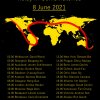Combinatorics
Research interests
The interests of the group are spread across a very wide range of combinatorics and related areas. More details can be found on our members' individual webpages - visit Who's who in Combinatorics.
Activities
There is a combinatorial theory graduate seminar on most Tuesdays during term at 1400hrs. Links to the full series listing and the next talk are below:
Alex Scott is the organiser of the seminar.
Oxford Discrete Mathematics and Probability Seminar (ODMAP)
ODMAP has been running since March 2020 online, and there are usually two seminars each term. The meetings are organised by Christina Goldschmidt and Alex Scott. Details of the talks, how to join the mailing list, as well as past talk listings, can be found on the ODMAP website. Watch previous seminars on YouTube.
One-Day Meeting in Combinatorics
The annual One-Day Meeting in Combinatorics runs every year in May or June. If you have any questions about the event, please contact Alex Scott.
The 2025 event was held in the Mathematical Institute, University of Oxford on Tuesday 27 May 2025. (View the programme here and details of previous meetings can be found here).
Graduate Courses - MT 2025
The Absorption Method in Combinatorics
Many problems in combinatorics fall into a challenging ‘intermediate’ regime: the constraints are too tight for standard probabilistic tools, yet too loose to allow direct constructive approaches. A prototypical example arises in graph decomposition questions—for instance, given that the necessary divisibility conditions are met, can one partition the edges of a complete graph into disjoint copies of a triangle? More examples arise in algebraic contexts. Given an additive set, can we order the set so that the partial sums are all distinct? Or, given a group, can we partition it into triples whose product is the identity?
The absorption method provides a powerful and versatile approach to such problems. Its key idea is to use probabilistic techniques to construct most of the desired structure, and then to exploit problem-specific configurations—called absorbers—to extend this approximate solution into a complete one.
Over the past two decades, the absorption method has become one of the central tools in extremal and probabilistic combinatorics, with applications ranging from graph decompositions to spanning structures and beyond. This course will introduce the method and walk through its core ideas, with the goal of getting participants ready to take part in current research.
C6 (capacity 20) starting Friday 24 October, 11AM to 12:30PM on Fridays of Weeks 2 through 8, inclusive. To sign up, contact Alp Muyesser.
Dynamical techniques in Ramsey theory
Course Abstract: This course is an introduction, meant to be approachable to finite combinatorialists, to topological and ergodic Ramsey theory. We will develop tools related to ultrafilters, topological dynamics, and ergodic theory, their correspondence with combinatorial objects, and give a consistent throughline to several classical and recent results in the area, including Hindman's finite sums theorem, Sahasrabudhe's exponential Ramsey theorem, and recent developments on Hindman's sums and products conjecture and Erdős' sumset conjecture.
Suggested prerequisites: Basics of topology, group theory, and combinatorics. In particular, the course is intended to be approachable to part C students and advanced undergraduates.
Primarily, the course would be of interest to people in combinatorics or analytic number theory.
C2 (capacity 20) starting Monday 20 October, 11am to 1pm on Mondays of Weeks 2 through 8, inclusive. To sign up, contact Matthew Bowen.
Useful Links
The group is based at the Mathematical Institute, University of Oxford. Instructions on how to reach the Institute can be found here.
Information about vacancies at the Oxford University Mathematical Institute can be found here.
If you are interested in undertaking graduate studies with us, please see the department's information for prospective graduate students.
Watch: International Congress of Mathematicians 2022 - Alexander Scott: Graphs of large chromatic number
International Congress of Mathematicians 2022
Alexander Scott: Graphs of large chromatic number
The International Congress of Mathematicians 2022 took place online. Held every four years, it is, of course, where Fields Medals are handed out. It is also where mathematicians are invited to give lectures in various categories, and in 2022 Alex Scott was so honoured.









